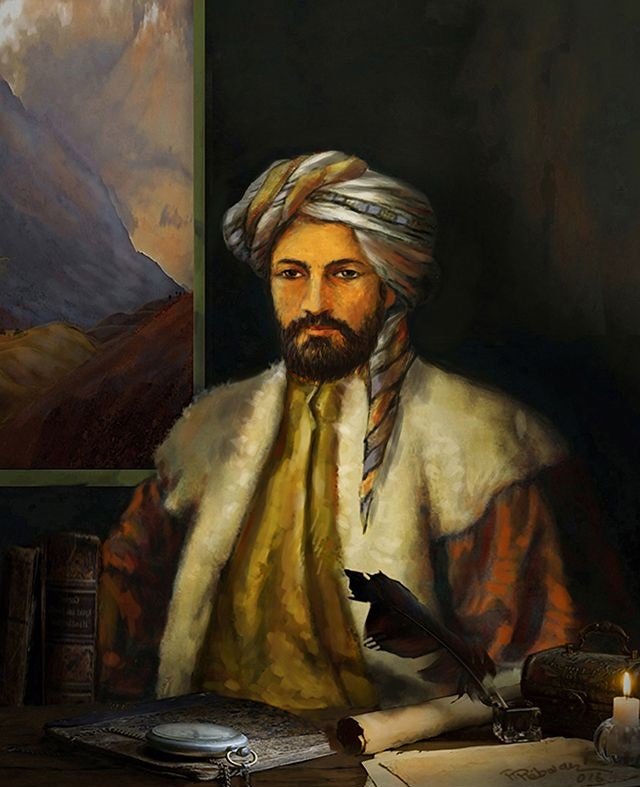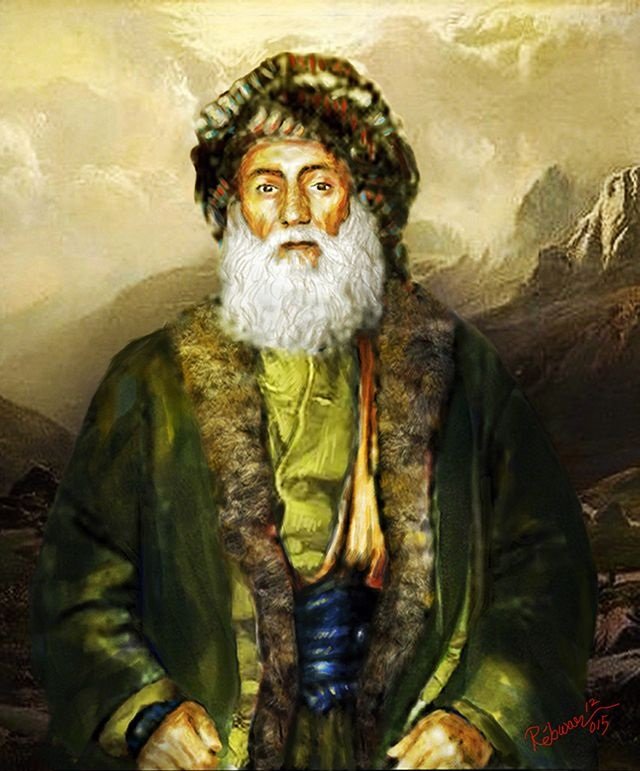This is a thread of people from Kurdistan you should know. Including men & women of different ethnic/religious backgrounds. I& #39;d like to start with Ibrahim Pasha Baban who found Kurdistan& #39;s beautiful Sulaimani City in 1784, which contributed a lot to Kurdish literature & culture.
Mastura Ardalan was a Kurdish poet, writer, historian & princess of the Ardalan principality. After the invasion of the Turkic Qajars of Persia into Ardalan, she fled to the principality of Baban. She was the only female Middle Eastern historian until the end of the 19th century.
Dildar, or Yunis Rauf, was a lawyer, poet & political activist from Koya, Kurdistan. As a lawyer he mainly defended poor farmers & oppressed Kurds. In 1938, he wrote Kurdistan& #39;s national anthem in prison & in the & #39;40s he joined the Republic of Kurdistan& #39;s resistance against Iran.
Karim Alaka was finance minister of the Kingdom of Kurdistan in the early 20th century. Alaka, a Christian patriot from Sulaimani, opposed the idea of Kurdistan being partitioned and given to artificially constructed states. He was a strong supporter of Kurdistan& #39;s independence.
Ihsan Nuri Pasha, a Kurdish Ottoman general, supported the first Kurdish 20th c. rebellions against Turkey. After a brief stay in the Kingdom of Kurdistan, he was declared the Ararat Republic& #39;s military commander, defending the republic for three years against invading Turkey.
Mustafa Pasha Yamulki (Nemrud Mustafa), from Sulaimani, was chairman of the Ottoman military court, later education minister in the Kingdom of Kurdistan. In the "war tribunal of Nemrud Mustafa," he sentenced Ataturk and other officers involved in the Armenian genocide to death.
Hapsa Khani Naqib, a feminist from Sulaimani, found the first women& #39;s school & first women& #39;s organization of the region. She was married to the PM of the Kingdom of Kurdistan, and as a strong supporter of self-determination, also supported Qazi Mohammad& #39;s Republic of Kurdistan.
Ahmadi Khani (Ehmedê Xanî) was a writer, poet & astronomer of the 17th c. Living in the principality of Botan, he wrote one of Kurdistan& #39;s most famous love stories "Mem û Zîn" in 2655 verses. With his poetry book for kids, Nûbahara Biçûkan, he wanted to promote Kurdish further.
Faqi Ahmad was a 17th c politician & commander who rescued and married the Frankish woman Keghan (Baban) - later one of Kurdistan& #39;s most prominent female leaders. Their children became founders of the Baban Dynasty that ruled for 200 years & promoted Kurdish literature & culture.
Some regard Yazidi Kurdish novelist Arab Shamilov as "father of the Latin-Kurdish script." Born in the Russian Empire, he was later exiled by Stalin. After the dictator& #39;s death, he moved to Armenia, continuing his literary work. His most famous book is "Şivanê Kurmanca."
Sarhang Almas Khan was a Kurdish poet from Kirmashan. He served as a leading military commander under Nader Shah, later during the Kurdish Zand Dynasty& #39;s rule he focused on literature. He collected epic poems of Kurdish oral tradition & wrote them down in the Kurdish Shahnameh.
Helena Hazabani or Helena of Adiabene was Queen in Hewlêr (Erbil) and Riha (Urfa/Edessa) in the first century. She was probably born into a Zoroastrian family but later converted to Judaism. Helena was noted for her generosity and helped Jerusalem during a famine in 45-46 CE.
Ismail Abulfeda, known as Abulfeda, was a Kurdish 13th/14th-century chronicler, geographer, commander, and Emir of Hama. He wrote "The Concise History of Humanity" which was translated early on into Latin, French & English. The crater "Abulfeda" on the Moon, is named after him.
Shams al-Din Shahrazuri was a 13th-century Kurdish physician, historian, and philosopher. He composed a biographical dictionary about ancient Greek and early Muslim scholars. His philosophical writings focus on Sheikh Suhrawardi& #39;s philosophy of Illuminationism.
Shahab al-Din Suhrawardi was a 12th-century Kurdish philosopher and founder of the Illuminationism school in Islamic philosophy that drew upon Zoroastrian & Platonic ideas. He wrote more than 50 works on philosophy and faith. His thoughts were influenced by Ibn Sina (Avicenna).
Qazi Muhammad was the first President of the first Republic of Kurdistan. His struggle for the people of Kurdistan & their right to self-determination made him a national hero. People arrived from all parts of Kurdistan to join his movement. He gave his life on that path.
Samand Siabandov was a Kurdish author, politician, and officer in the USSR. In WW2 he fought against Nazi Germany and was awarded many times, including "Hero of the Soviet Union" & the Order of Lenin. He also published several poems in Kurdish and an Armenian-Kurdish dictionary.
Meryem Xan is considered the first female singer from Kurdistan whose songs were recorded on gramophones. After the fall of the Ottoman Empire, she fled to her Kurdish relatives in Baghdad, where she recorded around 200 original and cover songs at the studios of Radio Baghdad.
Mahmud Barzinji was King of Kurdistan and fought for the right to self-determination and against Kurdistan being incorporated into British-created Iraq. His government included Muslims & Christians, and feminists like Hapsa Khan opened the first women& #39;s schools during his reign.
Ibn Khallikan was a 13th c. Kurdish scholar, jurist, and writer from Hewlêr (Erbil). He was deputy chief judge in Egypt, later chief judge in Damascus. His most prominent book is "Deaths of Eminent Men & History of the Sons of the Epoch," a biographical encyclopedia of scholars.
Muhammad Salih Dilan was a 20th c. Kurdish poet, singer & activist for the right to self-determination. Considered one of Kurdistan& #39;s greatest poets, Dilan wrote many of his works as a political prisoner. His poems had a considerable impact on Kurdistan& #39;s independence movement.
Mahmud Bayazidi was a 19th c. scholar from Bazîd (Doğubeyazıt). Working with Polish-Russian academic August Żaba, he collected more 50+ works of Kurdish literature for Russia& #39;s Academy of Sciences. He also wrote several books, the most important on contemporary Kurdish customs.
William Yohanna was a 20th-century musician from Sulaimani. His dedication to music & his homeland made him a loved artist throughout Kurdistan. He established several orchestras in Sulaimani, taught thousands of students and created musical works for operas, theaters, and more.
Qadir Dilan, a 20th-century musician and brother of Muhammad Salih Dilan, has created the melody of the famous Newroz song, known all over Kurdistan. In 1948, he & his brother met Kurdish poet Piramerd who wrote the lyrics on a cigarette box, asking them to write a melody for it.
Leyla Qasim, a resistance member from Khanaqin, executed for advocating the right to self-determination. Her last words: "Kill me, but you should know that through my death thousands of Kurds will awake from a deep sleep. I& #39;m glad to give my life on the path to a free Kurdistan."
Sheikh Said of Piran from Erzîrom (Erzurum) was a leader of the 1925-rebellion named after him. The Kurdish leader & his allies, who had close ties to other leaders in Kurdistan, including to King Mahmud, fought Turkey& #39;s repressive policies to gain more rights for Kurdistan.
Osman Sabri was a Kurdish author & politician from Kolik (Kahta). After Sheikh Said& #39;s rebellion was suppressed, he fled to what became Syria & Iraq. There, he published countless newspaper articles on Kurdistan & around ten books. He was jailed 20 times for political activities.
Abdulkadir Can, or Qedrîcan, was an author from Derik. In love with Kurdish literature, he wrote his first poems at university, and thus became a target for Ankara. After Sheikh Said& #39;s rebellion, he fled to West Kurdistan & taught Kurdish there. He published many poems & stories.
The wonderful Rebwar Khalid Tahir is a contemporary artist from Sulaimani in Kurdistan. He& #39;s the one who reinterpreted and created all the shown pieces of art in this thread. Not only is his art beautiful to look at, but it is also an important archive of Kurdish history.

 Read on Twitter
Read on Twitter






























